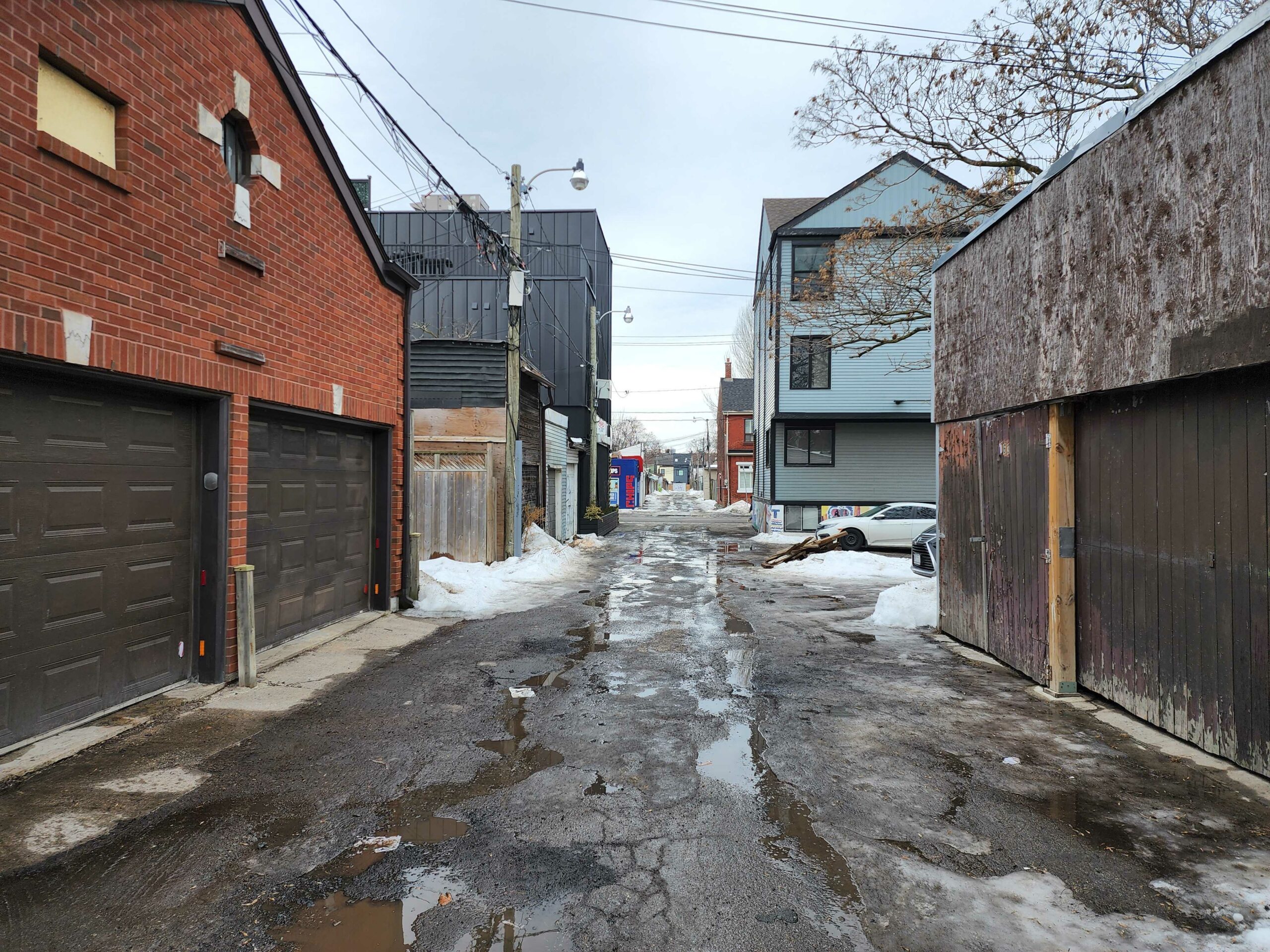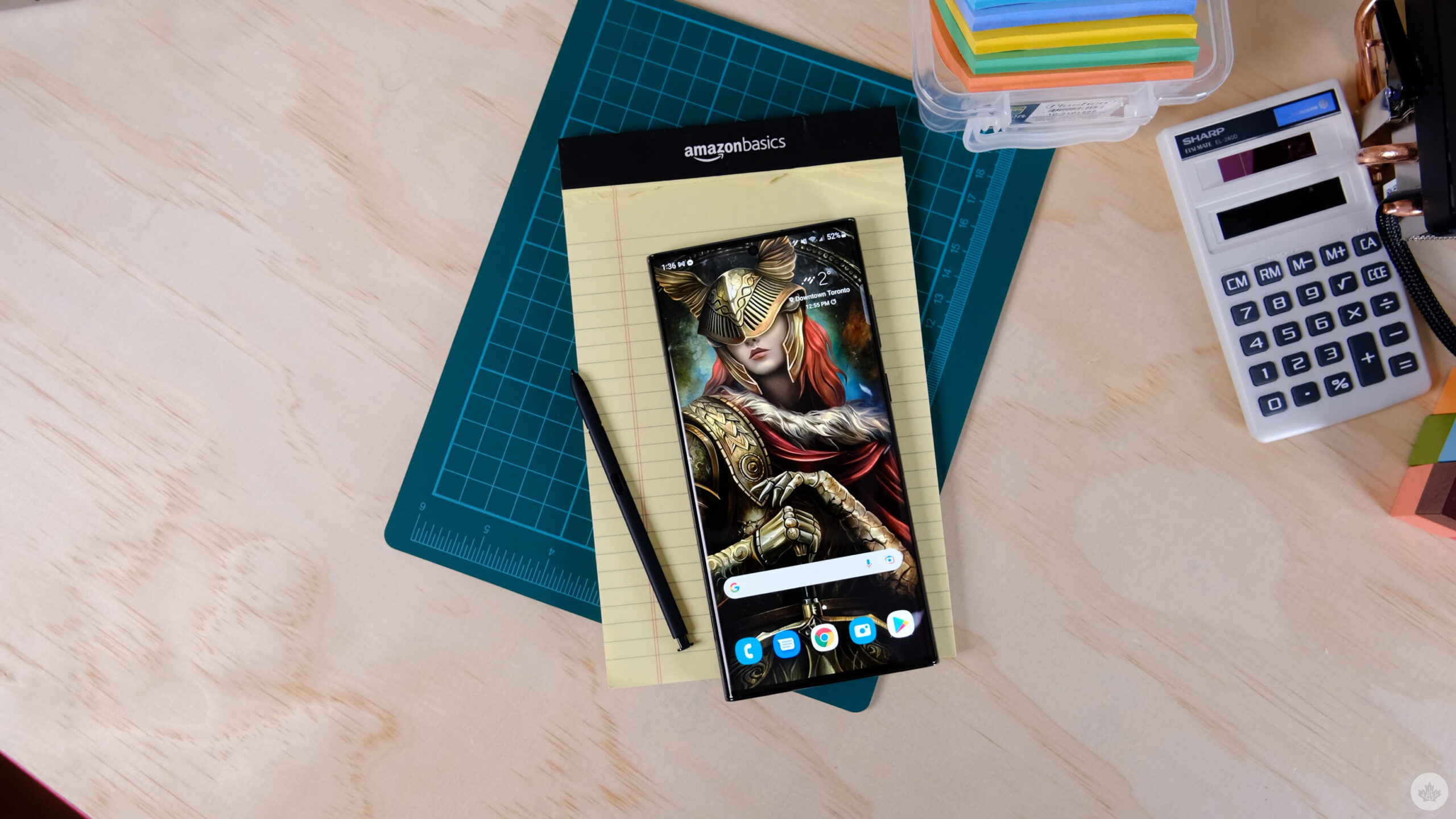
The Pros
- S Pen built-in
- Great display
- Good night move, improved portrait video
The Cons
- Expensive
- Less RAM
- Average battery
Samsung is the world’s leading smartphone manufacturer and sells its phones globally. The company offers ‘A,’ ‘J,’ ‘M’ ‘Z’ and the best of the best, its ‘S’ series flagships. As expected, this year’s Galaxy S22 Ultra is ahead of the pack.
While the South Korean phone maker hasn’t officially pronounced its Note series dead, this year’s Galaxy S22 Ultra swiftly takes the place of the company’s (presumably) discontinued brand by offering a Note-like shape, top-of-the-line specifications and the former’s ever-beloved S Pen.
Over the past few years, Canada’s smartphone market has become pretty bland, with companies like LG and HTC bowing out, Asus missing in action, OnePlus floundering and the U.S. government paralyzing Huawei. In Canada, all we have has is Motorola, Microsoft, Google, Apple and, of course, Samsung.
With this in mind, if you want the best and most reliable Android device out there, the S22 Ultra is for you. However, just like in years past, you’ll need to pay a lot for Samsung’s latest and greatest, Note-like handset.
If you’re looking for a more affordable device, check out Jon’s Samsung S22/ S22+ review.
So this phone’s just a Note?
Though Samsung’s latest ‘Ultra’ flagship looks like a Note, it features the S series’ camera array on a Note-like body, creating a great combination of both the sub-brands. Unfortunately, the S22 Ultra lacks expandable storage, one of the Note’s best features. That said, Samsung offers a variant with 1TB of storage for those that need the extra space, but as expected, this variant costs a lot of money — $2,209.99 CAD to be precise — which is still more affordable than the Z Fold 3.
Though my personal favourite thing about the Note brand has always been its expandable storage, the S22 Ultra’s stand-out feature is its stylus, the built-in S Pen. Last year’s S21 Ultra and Z Fold 3 both worked with the S Pen, but you had to purchase the stylus separately and there wasn’t anywhere to store it unless you purchased an awkward case. With the S22 Ultra, you’re getting the S Pen built-in.
Just like with the Note line, I still don’t have a reason to ever pull out the S Pen, but for testing purposes, I gave it a whirl.
Samsung Galaxy S22 Ultra
Samsung Galaxy S21 Ultra
Samsung Galaxy Note 20 Ultra
Display
6.8-inch Curved Dynamic AMOLED, 1,440 x 3,200 pixels, 20:9 aspect ratio, 120Hz display (variable 1-120Hz), HDR10+, 240Hz Touch Sampling in Games
6.8-inch Curved Dynamic AMOLED, 1,440 x 3,200 pixels, 20:9 aspect ratio, 120Hz display, HDR10+
6.9-inch Curved Dynamic AMOLED, 3,088 x 1,440 pixels, 21:9 aspect ratio
Processor
Snapdragon 8 Gen 1
Snapdragon 888
Snapdragon 865+
RAM
8GB of RAM, 12GB of RAM
12GB of RAM, 16GB of RAM
12GB of RAM
Storage
128GB, 256GB, 512GB, 1TB
128GB, 256GB, 512GB
128GB, 512GB (expandable)
Dimensions (in.)
163.3 x 77.9 x 8.9mm
165.1 x 75.6 x 8.9mm
164.8 x 77.2 x 8.1mm
Weight
229g
228g
213g
Rear Facing Camera
108-megapixel (f/1.8), 12-megapixel (f/2.2, 120-degree), 10-megapixel (f/4.9, 10x zoom), 10-megapixel (f/2.4, 3x zoom)
108-megapixel (f/1.8, OIS wide) + 10-megapixel (f/4.9, 10x zoom, OIS), 10-megapixel (f/2.4, 3x zoom, OIS)+ 12-megapixel (f/2.2, 120-degree FOV, ultrawide)
108-megapixel + 48-megapixel + 12-megapixel
Front Facing Camera
40-megapixel (f/2.2)
40-megapixel (f/2.2)
10-megapixel
OS
Android 12, One UI 4.1
Android 11, One UI 3.1
Android 10
Battery
5,000mAh
5,000mAh
4,500mAh
Network Connectivity
5G, LTE, Wi-Fi 6E
GSM/HSPA/LTE/5G
GSM/HSPA/LTE/5G
Sensors
Fingerprint (in-display), accelerometor, gyro, proximity, compass
Fingerprint (in-display), accelerometor, gyro, proximity, compass
Fingerprint (in-display), accelerometor, gyro, proximity, compass
SIM Type
Nano SIM, eSIM
Nano SIM
Nano SIM
Launch Date
February 25, 2022
January 14, 2021
August 5, 2020
Misc
Colours: 'Phantom Black,’ ‘Phantom White,’ ‘Green,’ ‘Burgundy,’ and Samsung exclusive colours ‘Gray,’ ‘Light Blue,’ and ‘Red.’ & S Pen with 2.8 m/s latency
Colours: Phantom Silver, Phantom Black, 120Hz @ WQHD+, S Pen compatibility, ultra wideband
Colours: Mystic Black, Mystic White, Mystic Bronze | S Pen
Display
Samsung Galaxy S22 Ultra
6.8-inch Curved Dynamic AMOLED, 1,440 x 3,200 pixels, 20:9 aspect ratio, 120Hz display (variable 1-120Hz), HDR10+, 240Hz Touch Sampling in Games
Samsung Galaxy S21 Ultra
6.8-inch Curved Dynamic AMOLED, 1,440 x 3,200 pixels, 20:9 aspect ratio, 120Hz display, HDR10+
Samsung Galaxy Note 20 Ultra
6.9-inch Curved Dynamic AMOLED, 3,088 x 1,440 pixels, 21:9 aspect ratio
Processor
Samsung Galaxy S22 Ultra
Snapdragon 8 Gen 1
Samsung Galaxy S21 Ultra
Snapdragon 888
Samsung Galaxy Note 20 Ultra
Snapdragon 865+
RAM
Samsung Galaxy S22 Ultra
8GB of RAM, 12GB of RAM
Samsung Galaxy S21 Ultra
12GB of RAM, 16GB of RAM
Samsung Galaxy Note 20 Ultra
12GB of RAM
Storage
Samsung Galaxy S22 Ultra
128GB, 256GB, 512GB, 1TB
Samsung Galaxy S21 Ultra
128GB, 256GB, 512GB
Samsung Galaxy Note 20 Ultra
128GB, 512GB (expandable)
Dimensions (in.)
Samsung Galaxy S22 Ultra
163.3 x 77.9 x 8.9mm
Samsung Galaxy S21 Ultra
165.1 x 75.6 x 8.9mm
Samsung Galaxy Note 20 Ultra
164.8 x 77.2 x 8.1mm
Weight
Samsung Galaxy S22 Ultra
229g
Samsung Galaxy S21 Ultra
228g
Samsung Galaxy Note 20 Ultra
213g
Rear Facing Camera
Samsung Galaxy S22 Ultra
108-megapixel (f/1.8), 12-megapixel (f/2.2, 120-degree), 10-megapixel (f/4.9, 10x zoom), 10-megapixel (f/2.4, 3x zoom)
Samsung Galaxy S21 Ultra
108-megapixel (f/1.8, OIS wide) + 10-megapixel (f/4.9, 10x zoom, OIS), 10-megapixel (f/2.4, 3x zoom, OIS)+ 12-megapixel (f/2.2, 120-degree FOV, ultrawide)
Samsung Galaxy Note 20 Ultra
108-megapixel + 48-megapixel + 12-megapixel
Front Facing Camera
Samsung Galaxy S22 Ultra
40-megapixel (f/2.2)
Samsung Galaxy S21 Ultra
40-megapixel (f/2.2)
Samsung Galaxy Note 20 Ultra
10-megapixel
OS
Samsung Galaxy S22 Ultra
Android 12, One UI 4.1
Samsung Galaxy S21 Ultra
Android 11, One UI 3.1
Samsung Galaxy Note 20 Ultra
Android 10
Battery
Samsung Galaxy S22 Ultra
5,000mAh
Samsung Galaxy S21 Ultra
5,000mAh
Samsung Galaxy Note 20 Ultra
4,500mAh
Network Connectivity
Samsung Galaxy S22 Ultra
5G, LTE, Wi-Fi 6E
Samsung Galaxy S21 Ultra
GSM/HSPA/LTE/5G
Samsung Galaxy Note 20 Ultra
GSM/HSPA/LTE/5G
Sensors
Samsung Galaxy S22 Ultra
Fingerprint (in-display), accelerometor, gyro, proximity, compass
Samsung Galaxy S21 Ultra
Fingerprint (in-display), accelerometor, gyro, proximity, compass
Samsung Galaxy Note 20 Ultra
Fingerprint (in-display), accelerometor, gyro, proximity, compass
SIM Type
Samsung Galaxy S22 Ultra
Nano SIM, eSIM
Samsung Galaxy S21 Ultra
Nano SIM
Samsung Galaxy Note 20 Ultra
Nano SIM
Launch Date
Samsung Galaxy S22 Ultra
February 25, 2022
Samsung Galaxy S21 Ultra
January 14, 2021
Samsung Galaxy Note 20 Ultra
August 5, 2020
Misc
Samsung Galaxy S22 Ultra
Colours: 'Phantom Black,’ ‘Phantom White,’ ‘Green,’ ‘Burgundy,’ and Samsung exclusive colours ‘Gray,’ ‘Light Blue,’ and ‘Red.’ & S Pen with 2.8 m/s latency
Samsung Galaxy S21 Ultra
Colours: Phantom Silver, Phantom Black, 120Hz @ WQHD+, S Pen compatibility, ultra wideband
Samsung Galaxy Note 20 Ultra
Colours: Mystic Black, Mystic White, Mystic Bronze | S Pen
To my surprise, some of the stylus’ features are pretty cool. ‘Air Gestures’ for controlling media and using it as a remote shutter to snap pictures works well. AR Doodle, which allows you to doodle using the phone’s cameras to create an augmented reality (AR) effect is pretty cute. Further, ‘S Pen to Text,’ which allows the S22 Ultra to translate your scribbles into text, works great. Still, none of these features are worth me actually pulling out the S Pen.
The S Pen’s 2.8ms latency is impressive, making writing on the S22 Ultra feel instantaneous and fluid. However, it’s still not quite like writing on paper. Despite my dislike of the S Pen, anyone who does enjoy using a stylus will appreciate this one. Additionally, there are currently no flagships on the market that come with a stylus, so the Galaxy S22 Ultra is your go-to choice (Motorola’s upcoming Edge 30 Pro is rumoured to feature a stylus).
Aside from its S Pen, the Galaxy S22 Ultra has a lot else to offer, including one of the best smartphone displays.
Just look at it
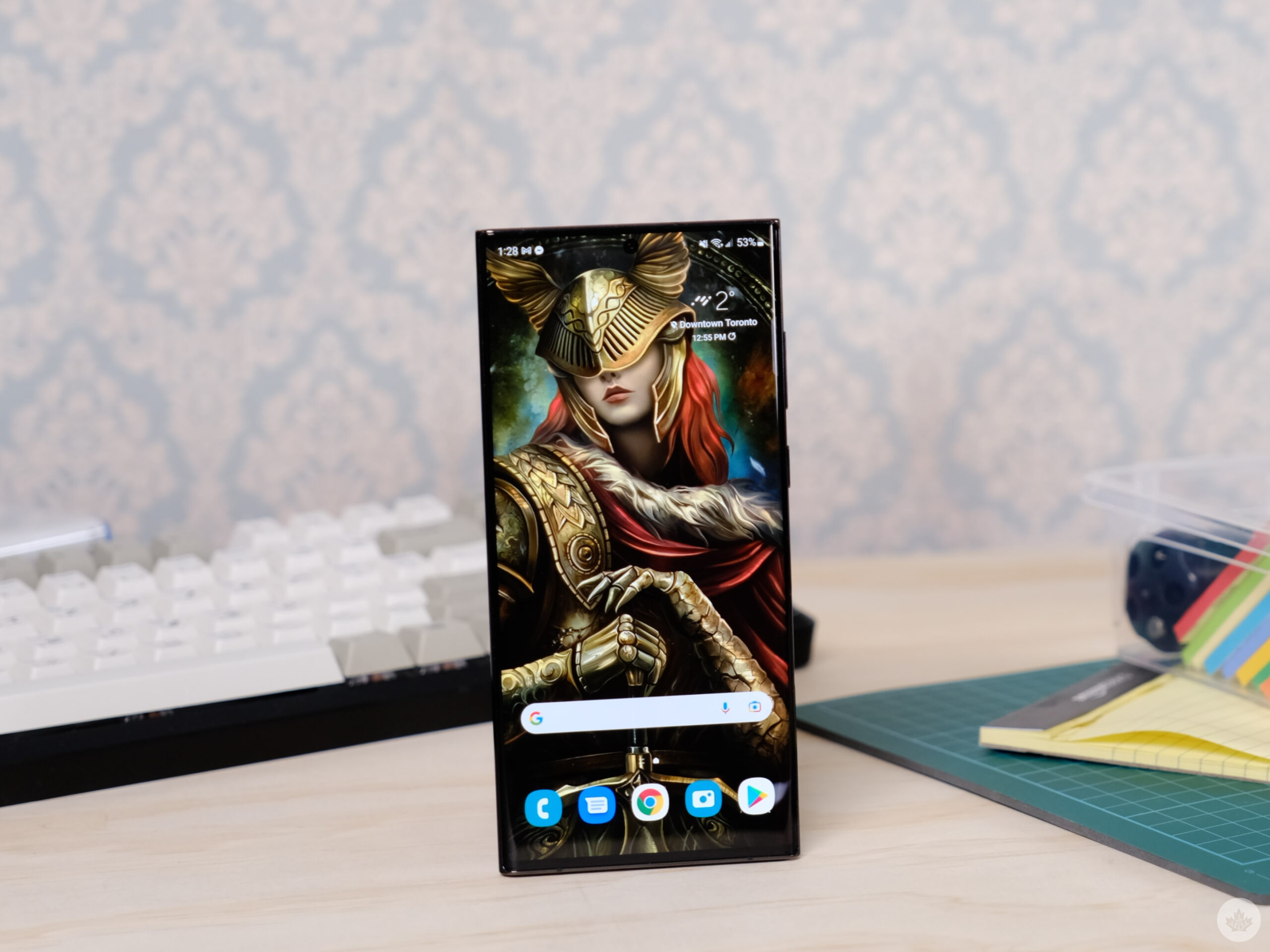
The S22 Ultra features a 6.8-inch 3040 x 1440-pixel resolution display that offers a 120Hz variable refresh rate that can drop as low as 1Hz. The phone displays content beautifully, images are crisp and it offers a full array of colours, as well as deep blacks and bright whites. I’ve watched tons of Netflix and YouTube videos alongside playing games like Wild Rift, and everything looks great on the display.
Due to its 120Hz refresh rate, swiping and sliding is buttery smooth, something that’s even noticeable while playing a game as simple as Tetris (Wild Rift isn’t compatible with 120Hz refresh rate on the S22 Ultra). Additionally, the display hits 1750nits at its peak brightness, making it very easy to look at even in direct sunlight.
Encasing this sizable display is an even larger body that measures 163.3 x 77.9 x 8.9 mm (6.43 x 3.07 x 0.35 in). To put this in perspective, S22 Ultra is wider and thicker than the Note 20 Ultra, longer and wider than the S21 Ultra, taller and thicker than the iPhone 13 Pro Max, and just all-around larger than the Pixel 6 Pro. And all those above phones are already pretty large.
With this in mind, similar to past Ultra devices, the S22 Ultra isn’t designed for people with small hands. However, after a few hours with the handset, I got pretty used to it.
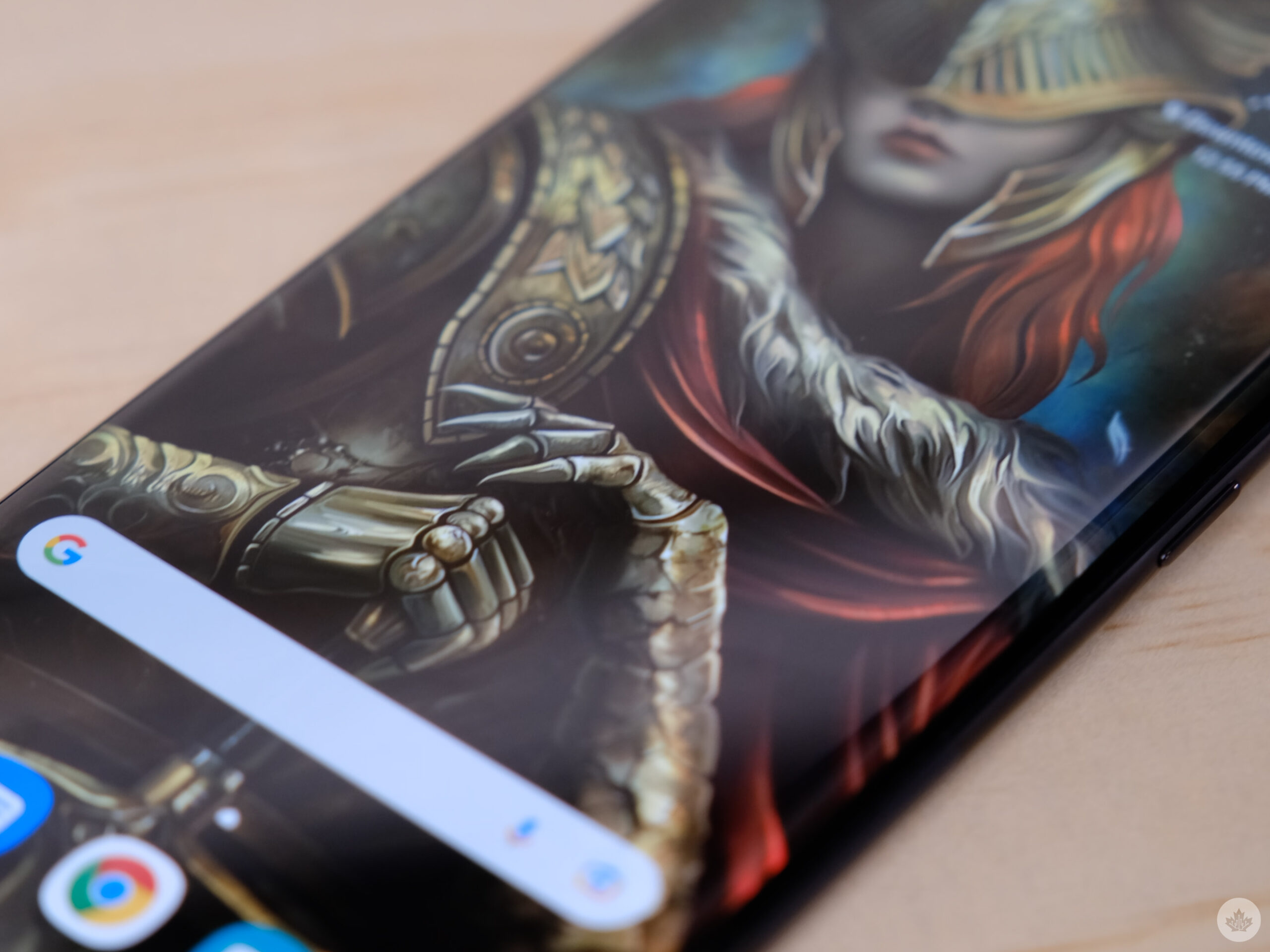
You can find the volume rocker and programmable Bixby button on the right side of the device and on the bottom, from left to right, there’s the S Pen, a speaker grille, USB-C port and a SIM card tray. Flipping the phone over to its Gorilla Victus+ glass back, there are five large sensors in the top left corner. Instead of a camera bump, Samsung took a cue from LG’s Velvet and ditched the camera housing. LG’s setup is slightly better; however, as the S22 Ultra’s cameras aren’t fleshed and protrude from the rear.
I like the look as I’m not a big fan of camera bumps, and it helps make the S22 Ultra stand out from other devices on the market, including even the Galaxy S22 and S22+.
S21 Ultra-like cameras
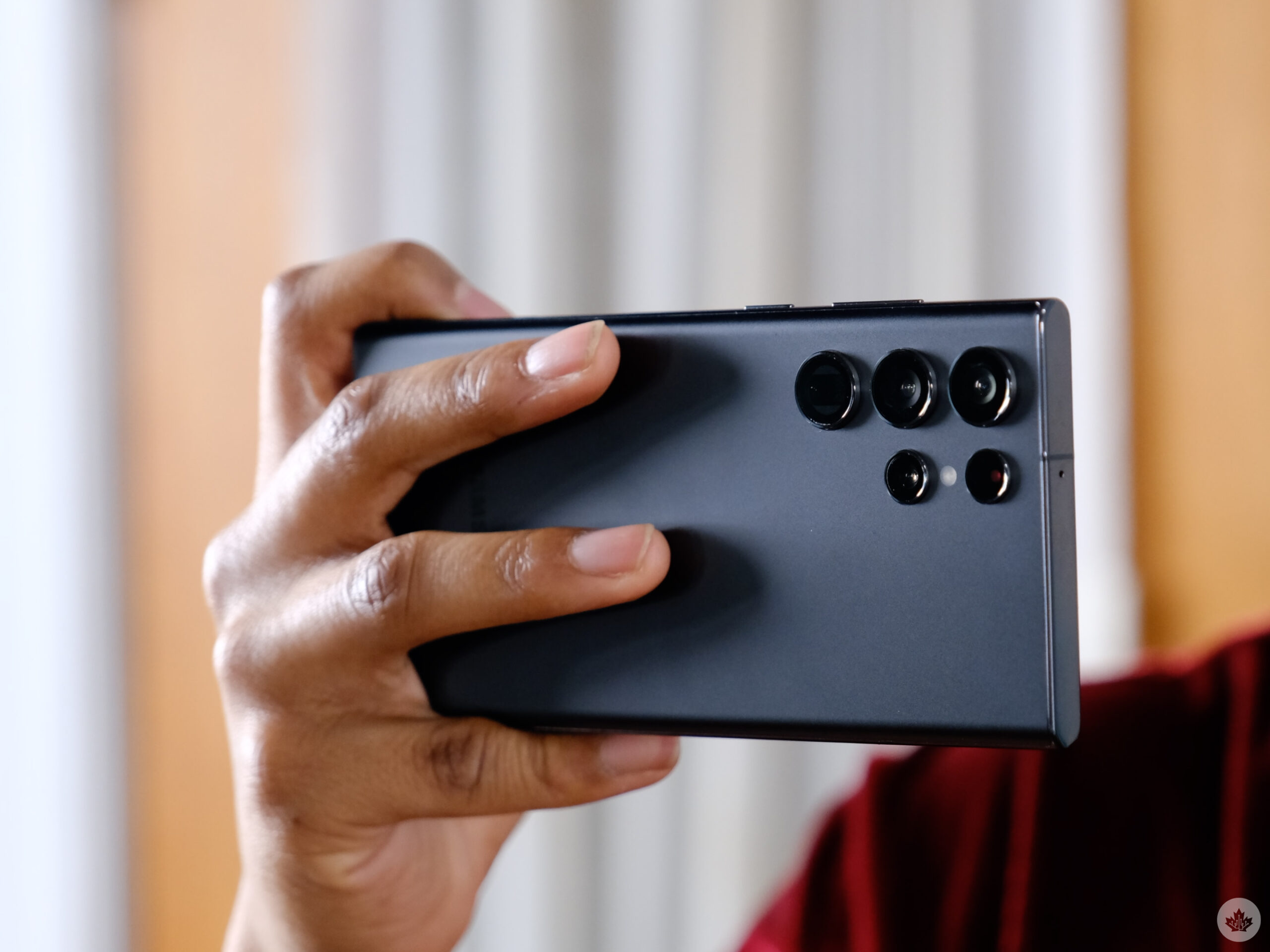
Samsung’s Galaxy S22 Ultra features a 108-megapixel primary shooter, a 10-megapixel periscope shooter with 10x zoom, a 10-megapixel telephoto camera with a 3x zoom and a 12-megapixel sensor paired with a 120-degree ultrawide lens. All four of these cameras work phenomenally, even at night.
The 108-megapixel camera is paired with ‘Super Clear Glass and Lens’ in order to improve low-light photography. The Super Clear Glass and Lens use an ultra-low reflection nano-coating to help with lens flare.
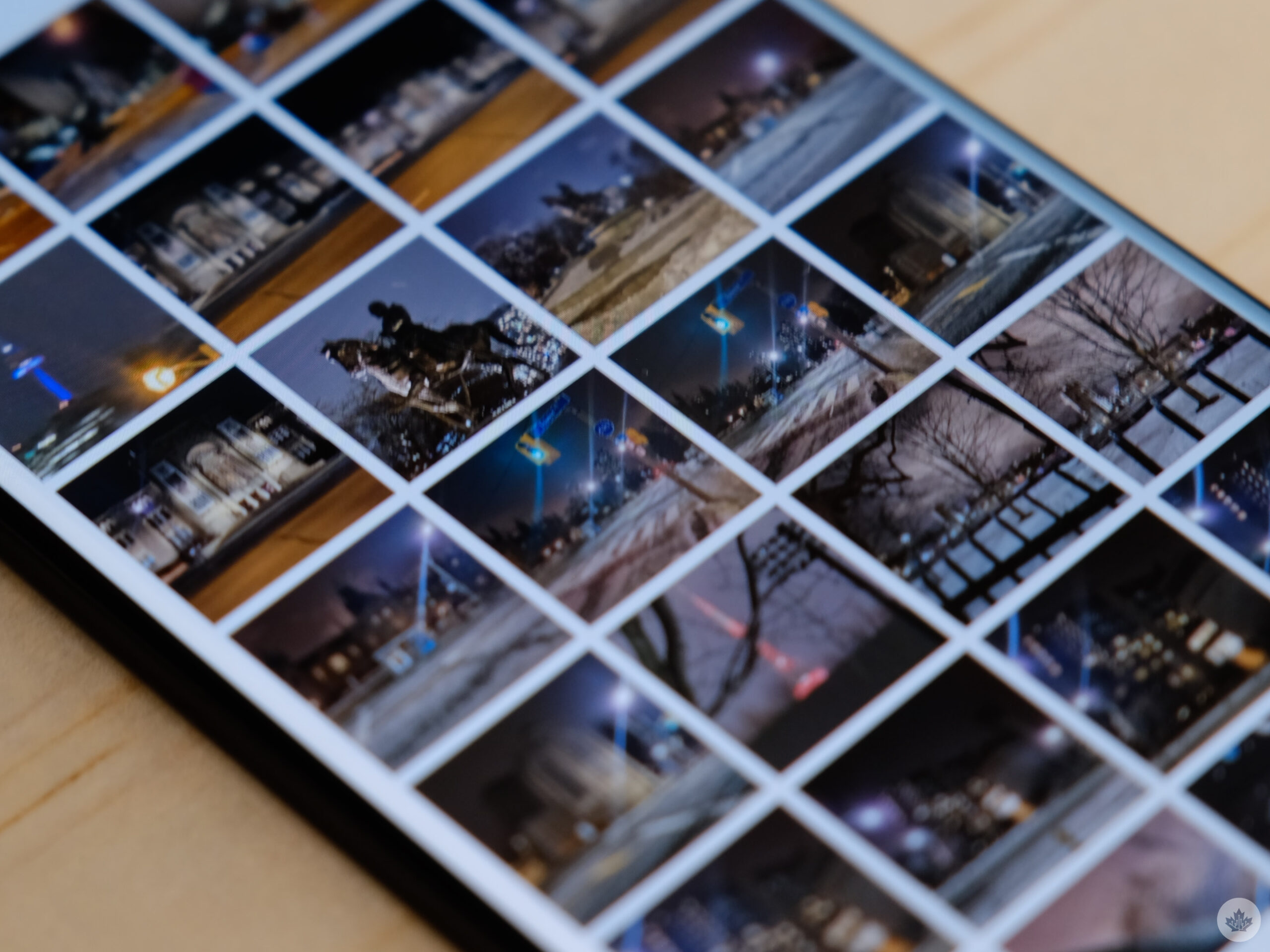
Both day and night photography are great, and the phone’s cameras capture detail, colour and offer a great dynamic range. At night you can make out the clouds in the bright sky or make shots of architecture and graffiti look like it’s daytime. Of course, Samsung continues to add oversaturation to images, but I’ve grown to like this style of photography. The ultrawide camera seems to produce similar quality, even in low-light. I definitely found these two shooters to be a highlight when shooting at night.
Like last year, the S22 Ultra’s 10x shooter is a beast and can snap detailed photos from quite a distance away. However, I’ve noted this lens’ low-light experience is pretty subpar compared to the primary and ultrawide shooters. 100x zoom is still here, and, like last year, looks blurry and digitized. But even after two years, I still find it impressive.
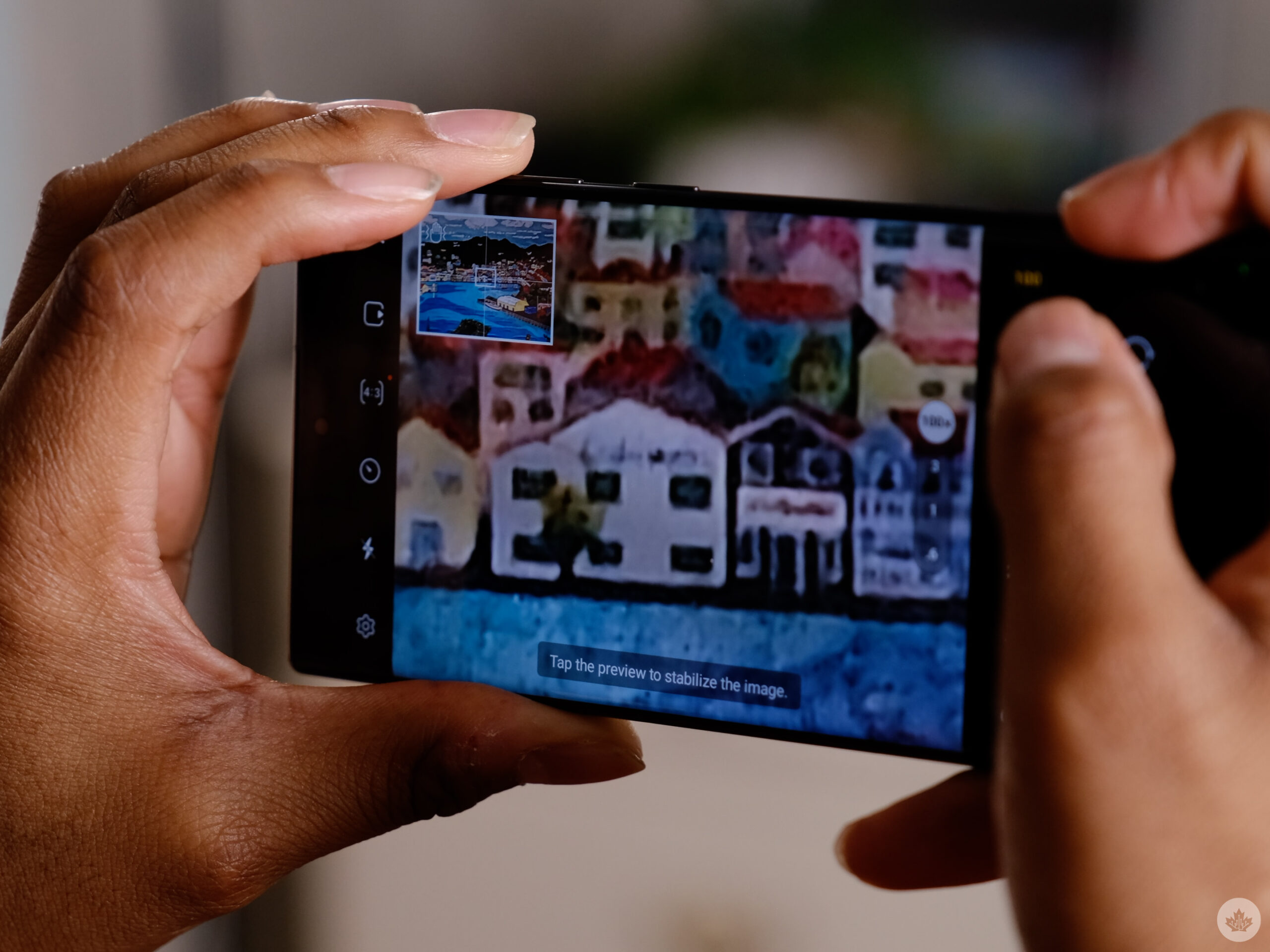
Portrait mode pictures are improved with more detailed depth mapping, which applies additional detail to the hair and keeps images sharp, instead of blurring these as it has in the past. For example, you can even distinguish between individual hair follicles in my beard.
Samsung is using the same 40-megapixel sensor in the front-facing camera as it did last year with the S21 Ultra. As usual, selfies make my skin a bit brighter than I’d like. Don’t get me wrong, sometimes it’s great, but roughly 70 percent of the time, the tone is off. Samsung needs to take a cue from Google or Apple when it comes to snapping pictures of those with dark skin, as I found both the Pixel 6 Pro and iPhone 13 Pro are more reliable when it comes to my skin tone.
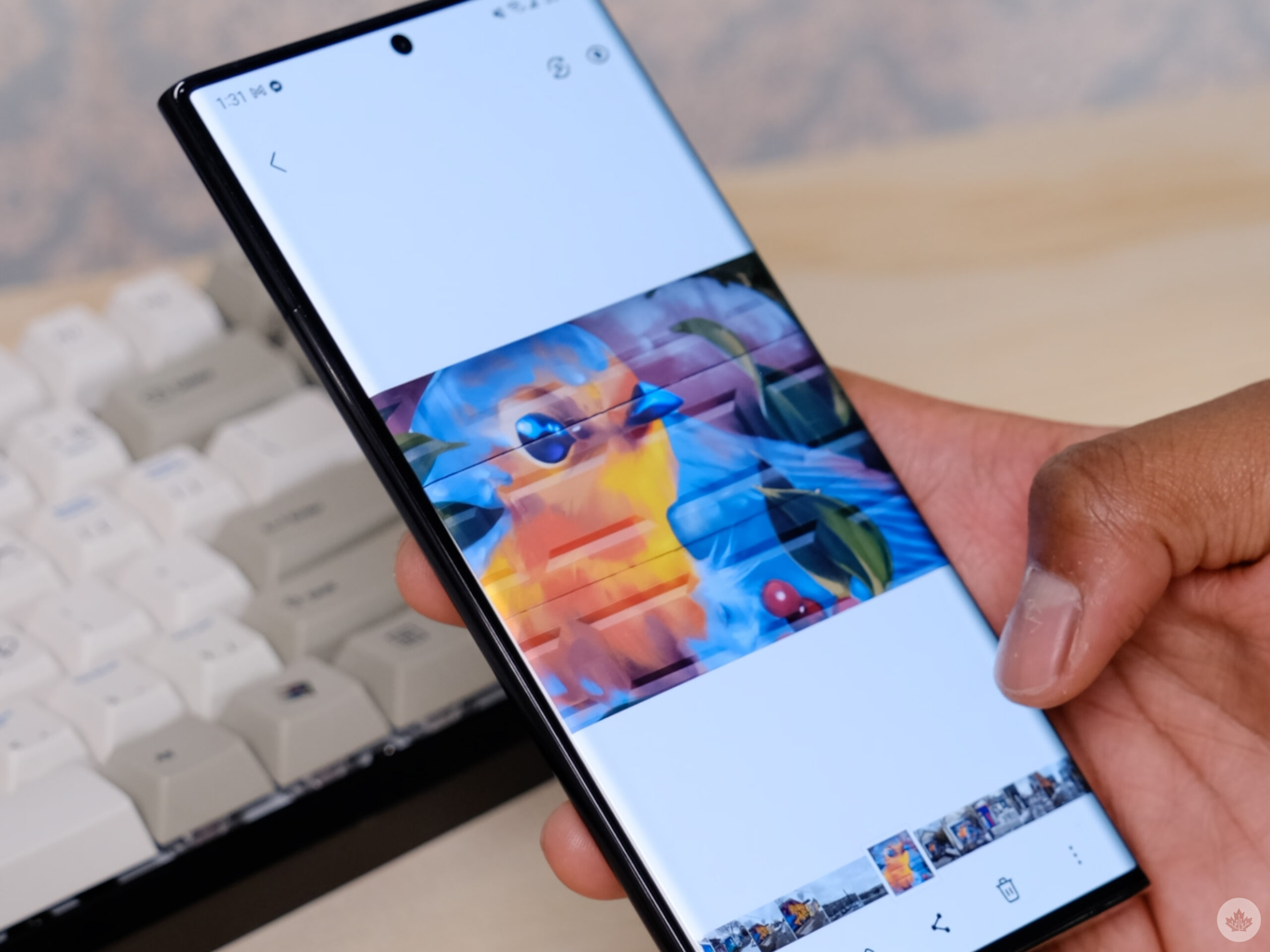
I found videos shot with the Galaxy S22 Ultra are very stable, and there’s a new auto framing feature that tracks up to 10 people and adjusts automatically as people move in and out of frame. I think it’s pretty cool functionality, but isn’t something I’d use often as I like to have more control over the videos I shoot.
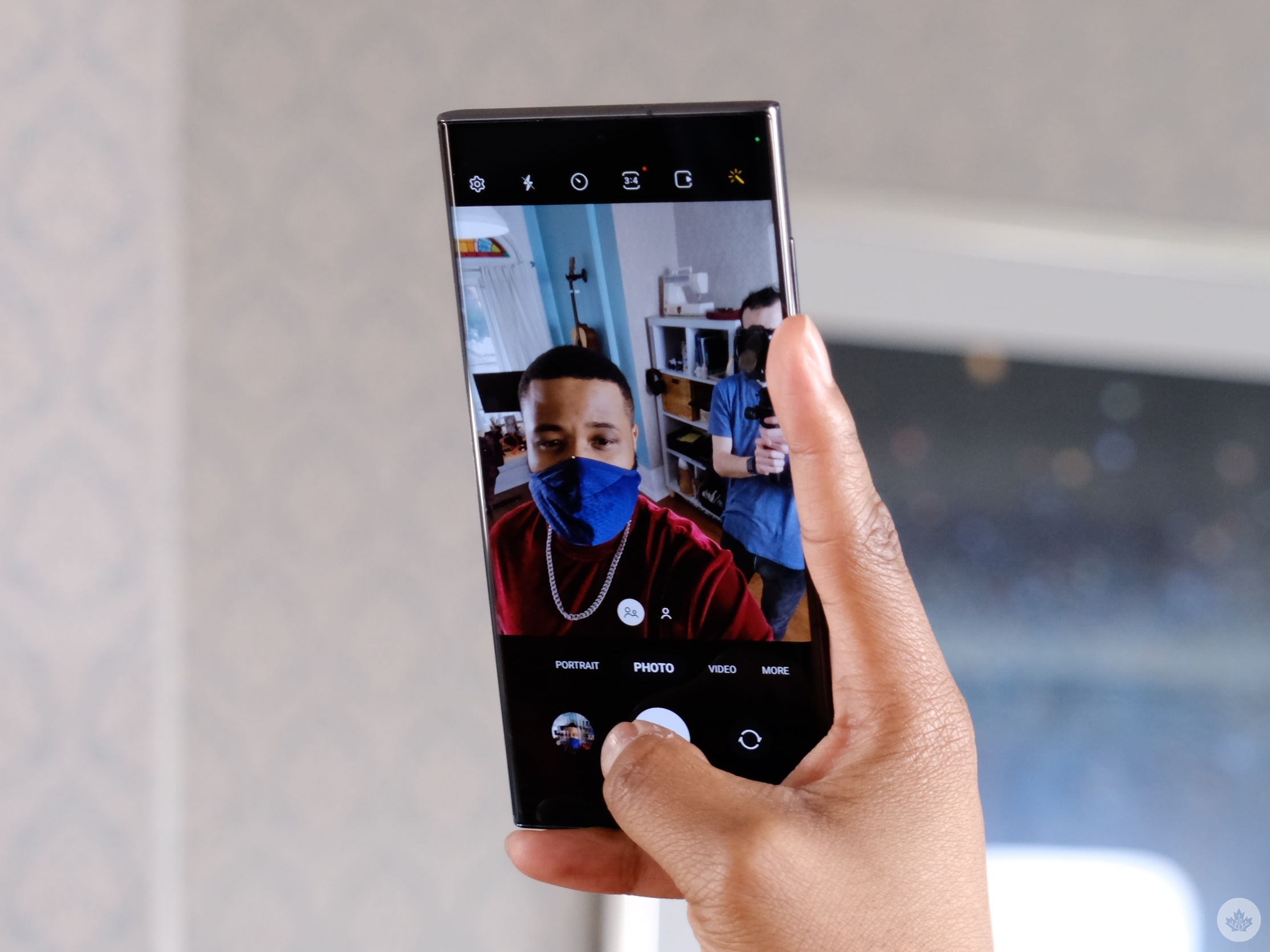
The new Portrait Video mode is also pretty cool and while it didn’t exactly mirror Apple’s ‘Cinematic Mode,’ it highlights me in videos while blurring out the background. Cinematic Mode is a bit more than just blurring the background as users can focus on any object or person in a scene, either foreground or background. Additionally, the Samsung variant only works if there’s someone in the video and there’s no way to control it. Either way, unlike the auto framing technology, Portrait Video was a highlight for me and functionality I’d use often when taking videos.
New processor, less RAM
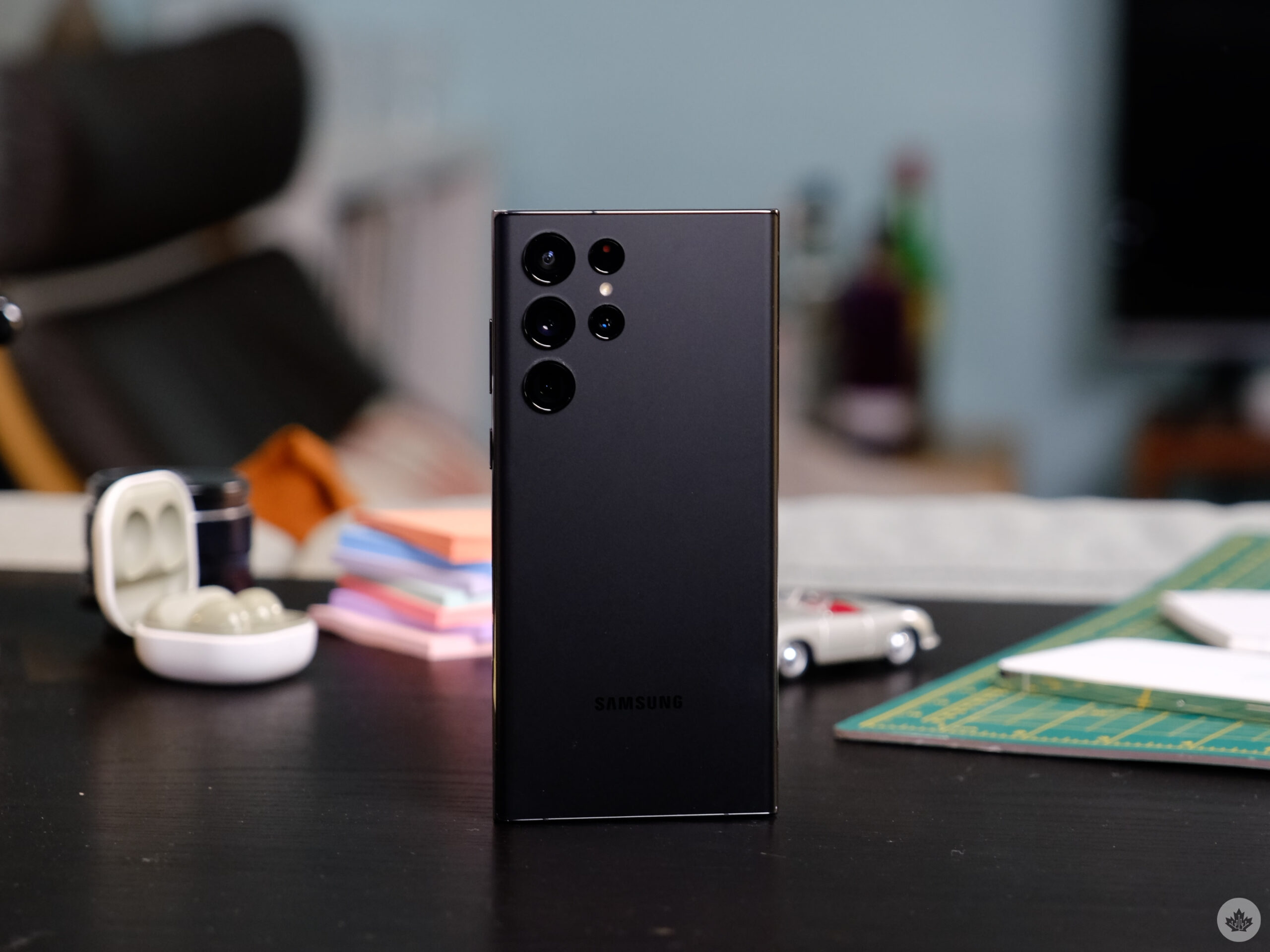
Samsung’s Galaxy S22 Ultra is powered by Qualcomm’s Snapdragon 8 Gen 1 and starts at 8GB of RAM. My review unit features 12GB of RAM, but the entry-level 8GB of RAM is worth keeping in mind. Unlike last year’s Galaxy S21 Ultra, the S22 Ultra tops out at 12GB of RAM, which means those that are looking for the 16GB variant are not going to want to upgrade to this year’s flagship.
I’ve never used a phone with 16GB of RAM, and find that 12GB of RAM is more than adequate. In my time with the S22 Ultra, it never crashed and I didn’t experience issues with apps closing too often.
The phone rarely ever got warm in my usage, even after several games of League of Legends: Wild Rift, taking pictures or general use. However, after running two benchmark tests on Geekbench, the handset did get quite warm. The S22+, on other hand, didn’t suffer from this issue.
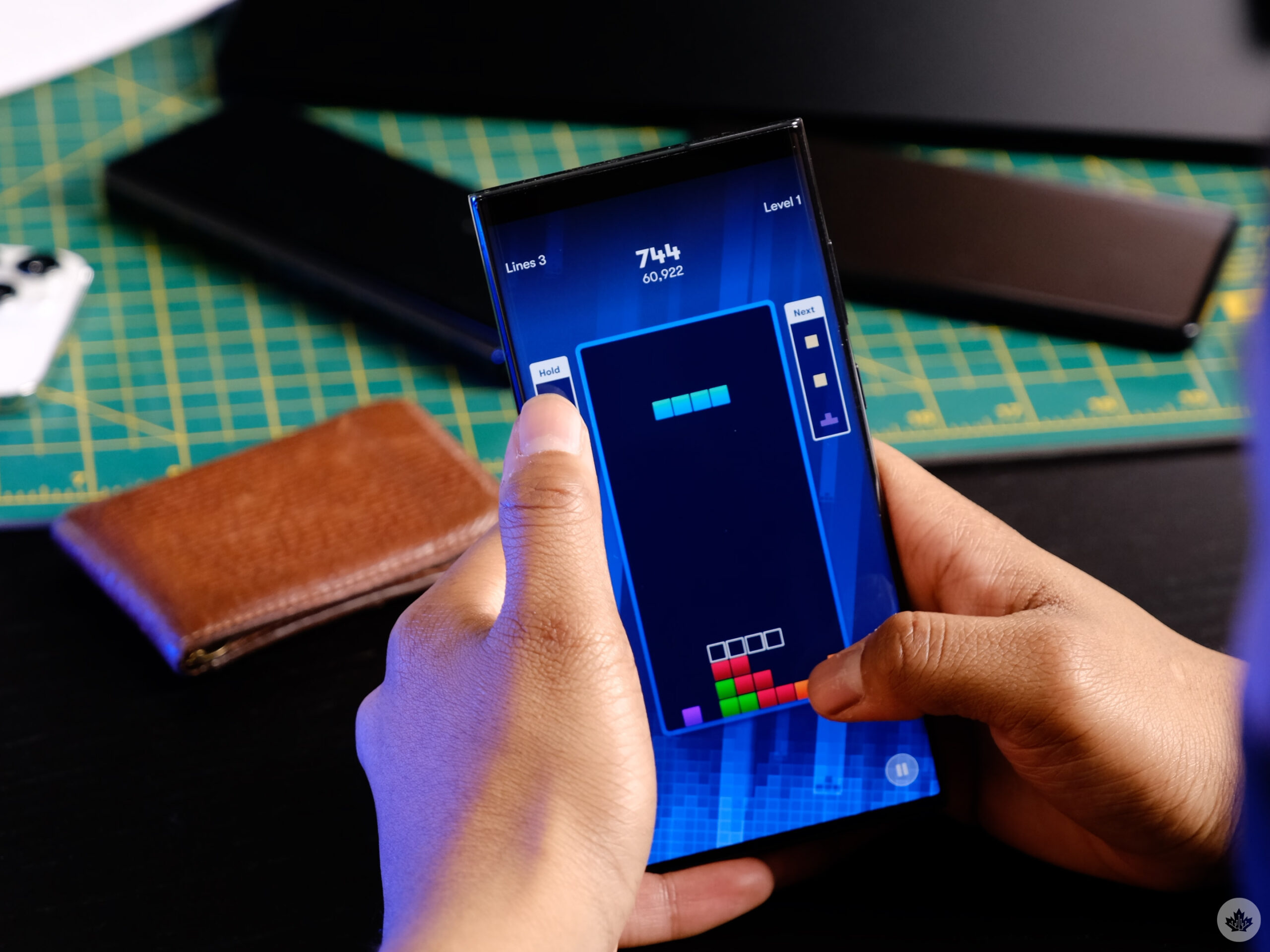
Speaking of benchmarks, the S22 series 8 Gen 1 chip performs similarly to the S21’s Snapdragon 888 in terms of single-core and multi-core scores. The iPhone 13 Pro Max’s A15 Bionic still leads the pack though. We don’t put much weight into benchmarks as phones like the Pixel 5, which hit pretty underwhelming benchmarks, is still a great smartphone.
Keeping this phone alive is a 5,000mAh battery. Similar to the Pixel 6 Pro, which also offered a 5,000mAh power source and a large screen size, the S22 Ultra can only last about a day, and I’d have to charge it at night, or I’d wake up with a dead phone. At most I get about five to six hours of screen time. Typically I play a few games of Tetris, listen to music, watch around 30 minutes of Prime Video, a couple of short YouTube videos here and there and message my friends. The battery life isn’t bad with the S22 Ultra, I’ve just seen better from devices like the iPhone 13 Pro Max, the Pixel 5 and even the P30 Pro.
As for its speaker, the S22 Ultra isn’t the loudest phone on the market, losing out to phones like the Galaxy Z Flip 3, Pixel 6 Pro and even the S21 FE. Using the Sound Meter app I determined that music peaked around 70 to 73 decibels, which equates to “busy traffic” according to the app. Overall, the S22 Ultra's sound quality is decent though not very notable.
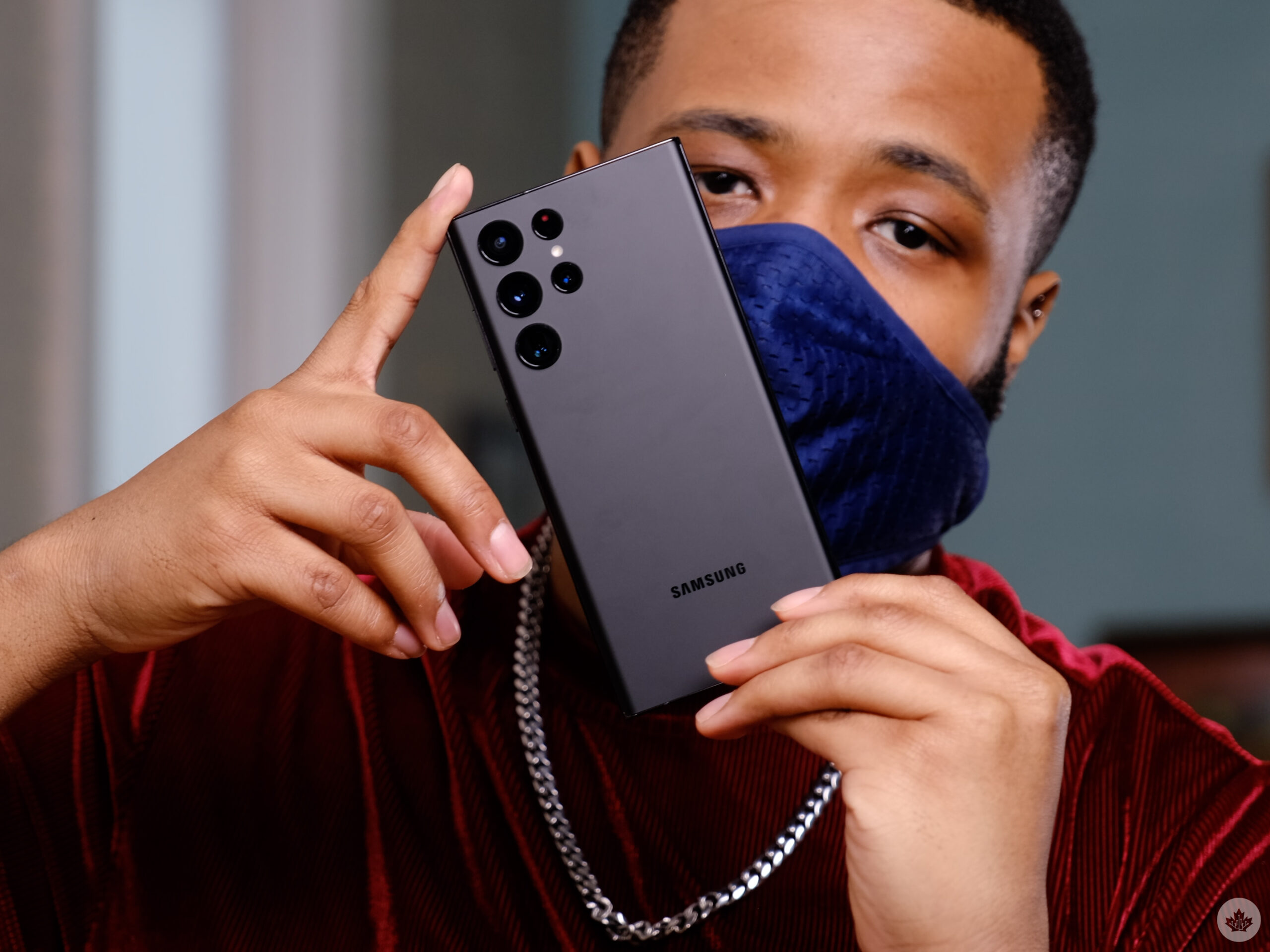
The New Note
I like that Samsung merged its S and Note lines. Two flagship launches per year were unnecessary and a bit messy. Now we have the S series for the reliable flagships you can count on, and the foldable Z series for those looking for something new.
Personally, I'm more of a fan of the Z series as I really like foldable devices, but if you're looking for a no-nonsense flagship, the S22 Ultra is a great choice as long as the price isn’t a concern.
Samsung’s Galaxy S22 Ultra starts at $1,649 for the 8GB of RAM/128GB of storage version. This pricing seems over the top considering last year's S21 Ultra was priced the same and offered 12GB of RAM. That said, with the S22 Ultra, you now get the S Pen but for those like myself that don’t find the S Pen that useful, the trade-off isn't worth it. This is even more frustrating when you consider the price of Google’s Pixel 6 Pro, which starts at $1,199 and offers 12GB of RAM/128GB of storage. Currently, Samsung is offering a deal that gets users double the storage for a lower cost. This would mean that the S22 Ultra costs $1,649 for 12GB of RAM and 256GB of storage, which is obviously a lot better. However, this deal is only available for a limited time.
For a Samsung fanatic who loves stellar cameras and the S Pen, the S22 Ultra might be worth it, otherwise, Android users might want to look to the S22+, the Z Flip 3 or the Pixel 6 Pro, for a more cost-effective choice.
The Samsung Galaxy S22 Ultra starts at $1,649.99 for the 128GB/8GB RAM variant and goes all the way up to $2,209.99 for the 1TB/12GB model. Buy it here.
Photography by Brad Bennett
MobileSyrup utilizes affiliate partnerships. These partnerships do not influence our editorial content, though we may earn a commission on purchases made via these links that helps fund the journalism provided free on our website.
"For a Samsung fanatic who loves stellar cameras and the S Pen, the S22 Ultra might be worth it"
MobileSyrup may earn a commission from purchases made via our links, which helps fund the journalism we provide free on our website. These links do not influence our editorial content. Support us here.













